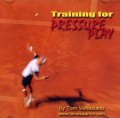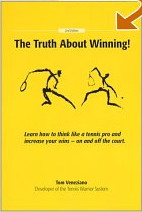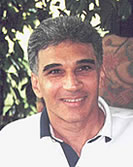In a doubles drill, here are my instructions to students: "Play consistent, move the ball around and wait for the right opportunity (a high short ball) to hit the winner." They always reply, "Okay, I got it." The players then proceed to the court and begin the game. On the very first point, one of the players up at the net receives a low ball and Blam! goes for a winner.
I question that player. "What were you doing?" The answer, "I was trying to win the point."
"Trying to win the point! I thought you were supposed to wait for the right opportunity (a high short ball) to go for the winner!"
Players are constantly thinking one way but acting in another. The problem lies in a misunderstanding of what "trying to win a point" means. What does it mean to you? Does "trying to win a point" mean hitting the ball for a winner and ending the point? For most players this is exactly what it means.
If that is your definition of "trying to win a point" would you then say that when Roger Federer is strategically moving his opponent around the court he is not trying to win a point? Of course, that's absurd! Roger is definitely trying to win the point! He just realizes he can win tons of points without hitting winners. He clearly understands that "trying to win a point" is a process that is part strategic and part blasting the ball for a winner.
Unfortunately this is NOT the way most players approach match play. Subconsciously they think they must go for something big, blast the ball for a winner or do something spectacular to try and win a point. This is the main reason why players constantly agree to wait for the right shot to go for the winner, but in reality do the complete opposite. This incorrect mindset causes players to lose many, many more points than they should. Are you guilty?
Do you realize if you could adopt this new mindset you could mentally begin playing like Roger Federer? He is a master at blending strategic play with winners. In order to accomplish this change of mindset you must first understand what wins on the tennis court: consistency and control. From now on, think of "trying to win a point" as strategic play, moving the ball around the court while allowing your opponent to crumble under the pressure of your consistency. If, during the course of this strategic play, your opponent presents you with the opportunity to hit a winner - take it!
A PLAN TO DEVELOP PATIENCE
Of course, if you are going to adopt this new mindset you will have to develop some patience. To help you understand this concept and fight the impatient demons inside, I have an interesting drill that you can try. When teaching a doubles drill I have one side do whatever they want and the other side hit only medium pace shots (NO BLASTING WINNERS OR POWER SHOTS). They can hit a winner but they cannot add extreme power. If there is a violation that team loses the point. I'm the judge to determine whether the ball has been hit too hard.
More often than not, the team that is allowed to use power and go for winners loses, and the team that cannot use power wins. Why? Well, you should have that figured out by now. The team that cannot use power becomes a more consistent and controlled team, allowing the other team to make more errors. Sure, the other team can hit the ball harder but that does not mean they will hit the ball in the court! Hitting the ball faster, harder or with power does not automatically translate into winning. The principle: POWER WITHOUT CONTROL IS MEANINGLESS.
Interestingly, the team that cannot use power begins placing the ball all over the court. Since that team is devoid of power they instinctively begin looking for other options. This causes them to strategically look for openings to move the ball around. Bingo! They are mentally playing like Mr. Federer.
In conclusion, remember "trying to win a point" is a process that is part strategic and part going for winners. And unbeknownst to the majority of players, most points are won in the strategic, patient phase of a point, and not in the winner phase.










 You will join 13,000 other subscribers in receiving news of updates to the Tennis Server along with monthly tennis tips from tennis pro Tom Veneziano.
You will join 13,000 other subscribers in receiving news of updates to the Tennis Server along with monthly tennis tips from tennis pro Tom Veneziano. 